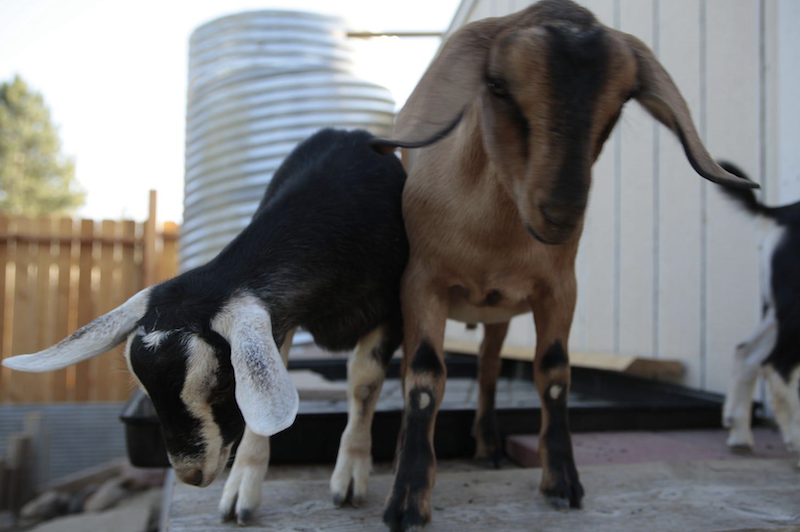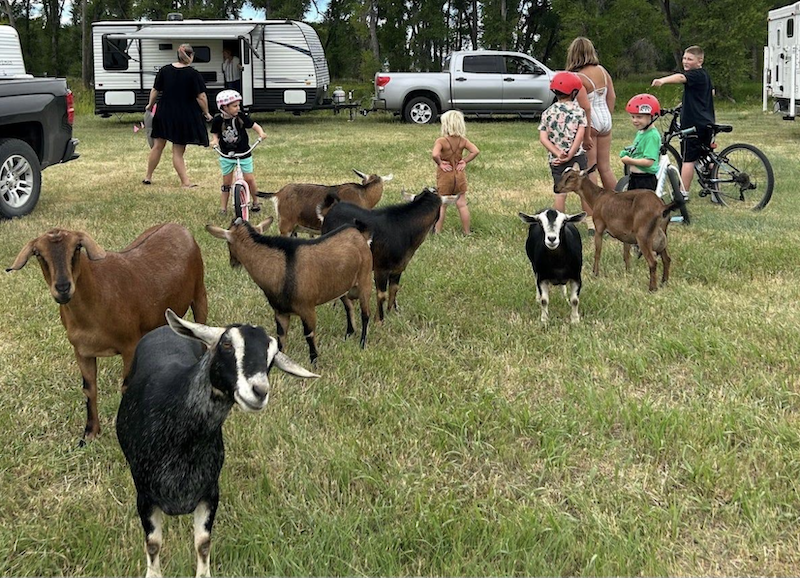|
A Reflection on Subsistence, Protection, and Relationship By Christina Trout Cohesion and integration is applying the Natural Being framework as a living pattern language to my own life. I’m demonstrating real subsistence, not commodity farming, but a reciprocal relationship with life, death, food, soil. This is a personal story, a love letter to little Miss Opal, one of my OG goats, one of the first four, one of my teachers. She was the first to get pregnant. But her labor stopped. The kids inside her had died. That was a $2,000 ticket to help her survive that loss. There was a lot of soul searching... a lot of self-judgment about how I handled it, knowing for one, she was already six years old with no pregnancies in her youth, so at risk. I choose to try for a herd. From 4, I went to 15, now 14. And soon, the herd will expand with younger nannies. Now, a few years later, she's facing something similar, Maybe carrying dead kids again, at an older, more fragile age. Her back end, always a little weak, has been failing. She's in pain. And today, I made the decision to take her to a small, local butchery here in El Rito, New Mexico, an FDA-supported small butchery, to have her slaughtered, butchered, and packaged. It sounds harsh. But when you really know an animal, when they've lived a full life by your side, grazing, negotiating, loving, living, you realize that kindness sometimes looks different than what we were taught. Goats are master negotiators. They don't thrive by being house pets. They learn through their herd, from the elders, from each other. They are deeply relational animals, and to raise them well means to allow them to live as goats, not as ornaments. I made the decision to keep a billy goat, Forest, intact and not isolated. To let the herd live as a real herd. Yes, it increased risk for the older does. Yes, it led to hard decisions like this one. But it honored their natural life, their natural being. And Opal? She lived joyfully. She was a curious, affectionate goat, flirty with Forest, even in her old age. Forest was gentle with her. They had a love, not just an instinct. It was obvious. She sought him out and got jealous too. In these final months, her pain made itself known. And so, today, I walked her home. I won't pretend this was easy for me. But oddly... I don't feel tragic or emotional. I feel grateful. I feel more sadness for the shift in our relationship than for the loss of her life. Because I know she was ready. I know she was hurting. And now, she will become part of my soil, my meals, my living memory. I will use her hide. I will honor her meat. I will speak of her as a teacher. Goats have taught me more about being human and being in relationship than many people have. They don't judge or hold grudges. They remember everything, especially what they have won in negotiations. They don't care if you are doing it the "right" way. They always give you honest feedback through the relationship itself. I have been judged for how I live with my goats — going mobile, living simply, feeding them with what the land provides instead of falling into the commercial feed cycles. I've been told I shouldn't have animals unless I have wealth (translated to house, pen, zoning, odd social norms and rules).But this system I'm building, this subsistence economy of relationship, is proof that another way is possible. Because of them, I have goat milk, goat soil, goat meat, and goat medicine. Because of them, I know I can adapt. Because of them, I know abundance is not the same as money. When I delivered Opal to the butchery today, it was not a corporate, industrial machine. It was a small, old-world operation, a homy office filled with family photos, paper stacks, and trophies from local competitions. It felt human. It felt real. And when I said goodbye to Opal, she wasn't afraid. Not trembling, not panicking. She was curious. Calm. Driving home, a tiny funnel of tumbleweed, like a mini tornado, rose from the ground and with a burst of expression, scattered the tumbleweed in pieces, a little dancing dust devil, with attitude. Opal had attitude just like it and in Opal’s transition, she may know what I think of tumbleweed. It felt like Opal’s spirit whispering: I’m still here. I'm okay. I’m free. There is often a cynical voice in me questioning ‘magical thinking’ or projections in general, but this one felt real in my body. I thought, if Opal was set free at that moment, I can expect a call. Sure enough, when back in range, maybe 30 minutes later, I was called with the bad news, her meat is not safe to eat given the condition of her organs. No dead babies. Simply time by her health and condition. I asked for the hide and the skull, the meat to be chopped to feed my shepherd-husky mix, who also shepherds the herd. Reciprocity in motion. I will brain-tan the hide with my father who knows how. She was the softest goat to pet, the most sensitive, the sassiest in a quiet determined way, like the force of tumbleweed riding the wind. Closing Reflections
Today, Opal taught me, Subsistence is relational. Protection is relational. Life and death, beginnings and endings, are not separate from the garden we walk every day. Walking our own gardens, walking with our animals, our mistakes, our choices, is how we learn. Not from textbooks. Not from perfect plans. But from life itself. Opal, my old teacher. Thank you.
0 Comments
Your comment will be posted after it is approved.
Leave a Reply. |
Submit your ideas for local feature articles
Profiles Gardening Recipes Observations Birding Essays Hiking AuthorsYou! Archives
October 2025
Categories
All
|


 RSS Feed
RSS Feed